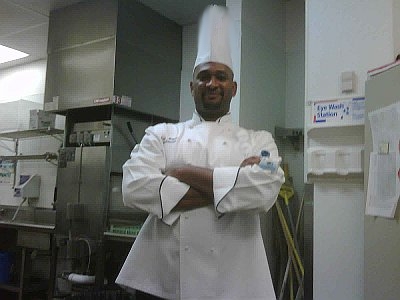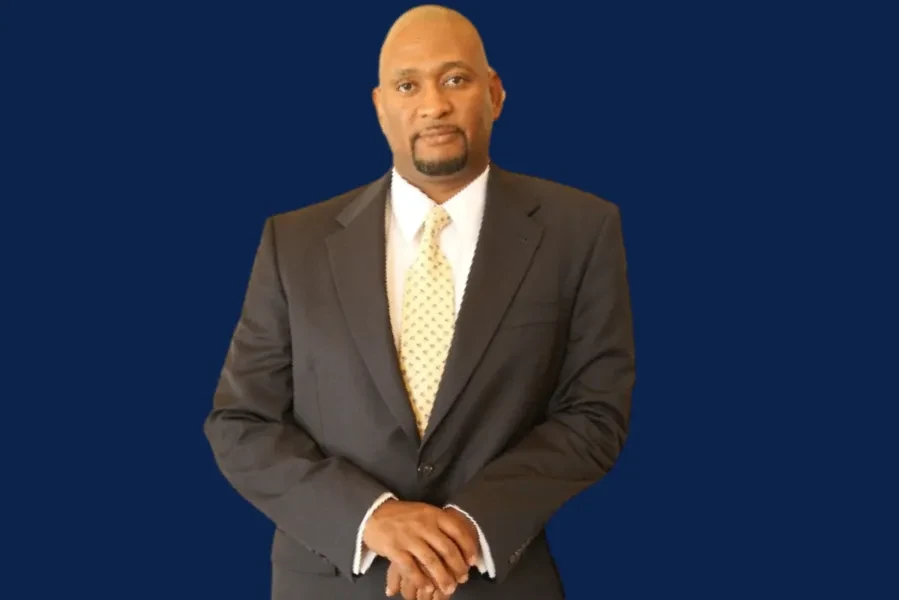While others may call the University of Arizona Global Campus (UAGC) faculty member Dr. James Moore an educator, veteran, and even a foodie, he describes himself as a storyteller.
Dr. Moore lives a colorful life, where he pursues many interests across several industries. His military service offered a perspective on world cultures that aided his ventures through food, writing projects, and now education. Today, he looks at his life as a collection of “cool moments,” where he derives both skills and pursuits from lessons others bestow on him.
“It was me learning to listen,” Dr. Moore says of his experiences. “I think when you start to listen, you start to see, and when you see, you understand better.”
Through his various accolades and a diverse job history of technical, culinary, and now entrepreneurial teaching, he is finally taking time to slow down and apply that knowledge set to present-day interests along with his UAGC career.
Learning the Context
Like the details of a good story, Dr. Moore uncovers deeper meaning in his interpersonal encounters. As a youth, he was a member of the foster care systems, spending ages six to eight in the Oklahoma system and then 14 to 19 in Tucson, AZ. This environment was challenging, but it motivated him to pursue success, and he credits his affinity to finding perspective in these times.
“I was supposed to be a statistic,” he says. “I was told, ‘you're not going to make it. You have no shot.’ And I was like, ‘I have to prove some folks wrong.’ That was my attitude. I had a tiny chip on my shoulder.”
Dr. Moore joined the military at 19 years old, entering the Marine Corps and serving six years. At the time, he held a background in information technology (IT) and applied his knowledge of computers and data to his work in the armed forces. Eventually he was stationed in Saudi Arabia, which kicked off his aptitude for learning other languages as a means of relating to his surroundings.
“What I learned in my travels is that if you go somewhere and you can greet them in their language and say at least a few words, they respect that,” he explains, “and people work with you better.”
The attitude he carried in his youth had the potential to carry over into his teaching, but he uses this background to relate to his students instead, by acting as an example of adversity overcome.
“It took me a while to learn to communicate and use other lenses,” Dr. Moore says. “It was a tough journey.”

From Food to Teaching
Throughout Dr. Moore’s varied passions, perhaps his strongest one (outside of education) lies in food. He possessed an interest in the culinary industry even before he entered the military. In those formative years, the opportunity to sample other country’s cuisines during and after deployment eventually pushed him into the Culinary Institute in Phoenix after his military service.
“Most of the time, when I experience other people's culture, I experience it through food,” he says, “so it was a great translation for me to come out of the military and go right into culinary.”
Dr. Moore found that the parallels of a standard kitchen to the military served as a surprising correlation during his time learning about food.
“I found that the culinary world works off the brigade system, which is based off of the military,” Dr. Moore explains. “We had our executive officers and non-commissioned officers (NCO) and sergeant major and gunnery sergeant… and the Executive Chef, the sous chef, the chefs de partie …. it all fits. So, it made sense to me.”
Dr. Moore’s track record with cuisine inspired his current occupation, as his teaching career also began with food. His education became intertwined with the requirements for the culinary institute, where he needed a bachelor’s degree for a teaching position there, and a master’s for consideration of other roles. Therefore, Dr. Moore completed the entire spectrum of higher education without stopping, from his bachelor’s degree to his doctorate in business administration, and is now decelerating to appreciate his journey thus far.
“As I get older and more into teaching, I have to learn to kind of enjoy life. Take a minute, take a breath,” he says, “because I didn’t do that for a long time.”
In Pursuit of Art
While Dr. Moore switched teaching gears back to technology and eventually business, he broadcasted his love of food across more than just the classroom. In addition to being the board president for Radio Phoenix, he hosted a radio show as his very own “food corner,” and even took to YouTube to talk about his culinary findings. While describing mom-and-pop shops was purely a hobby for him, he enjoyed creating a platform for his artistic prowess.
Beyond his own entrepreneurship, Dr. Moore also maintains a creative spirit. He is a published author, with one book complete and three others in the works. His inaugural publication, Sqerm, dives into different aspects of human interactions and how the species comes into existence. Originally meant for the big screen, Dr. Moore took his idea and applied it to traditional publishing as another way to support his desire to tell stories.
“At its core, it's about relationships,” he says. “It flowed because I wrote the screenplay and I couldn't get someone to publish it, to produce it, so I took the screenplay and blew it up into the book to get some eyes on it.”
Joining the UAGC Table
Dr. Moore joined UAGC as a part-time faculty member in 2009, while he maintained his role at the culinary institute and transitioned to a full-time position in 2013. Teaching a roster of classes like BUS 621 Leadership and Teamwork and BUS 637 Entrepreneurship as a core faculty member of the MBA program are offerings bespoke to his skills.
Like many teachers, the “aha” moments his students experience fulfill his career, and the caveat of understanding other cultures deepens the relationship. One particular compliment remains a touchstone moment in his career, when a former student hailing from Japan that studied under Dr. Moore in the culinary school told him he had a special outlook on life. After a lesson on samurais and their values surrounding food, she told him that he possessed “the spirit of a samurai,” due to the efforts he puts forth in his work and in other areas of life.
“That was the coolest comment as a teacher I ever got from someone from Japan, telling me I operate like a samurai,” he laughs.
Dr. Moore stays connected to former students by playing online chess, as his chief extracurricular involvement with the university. Through it all, he continues to use his collective knowledge to be the best educator possible.
“Learning those things from different cultures helped me become a better teacher,” Dr. Moore concludes.
